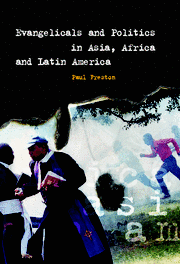Book contents
- Frontmatter
- Contents
- Foreword by David Martin
- Acknowledgements
- List of abbreviations
- Introduction
- PART ONE BRAZIL
- PART TWO ASIA
- PART THREE AFRICA
- 9 Sudan
- 10 Angola
- 11 Mozambique
- 12 Zimbabwe
- 13 Malawi
- 14 Rwanda
- 15 Uganda
- 16 Ghana
- 17 Kenya
- 18 Zambia
- 19 South Africa
- 20 Nigeria
- PART FOUR SPANISH-SPEAKING LATIN AMERICA
- Conclusion
- Bibliography
- Index
- Frontmatter
- Contents
- Foreword by David Martin
- Acknowledgements
- List of abbreviations
- Introduction
- PART ONE BRAZIL
- PART TWO ASIA
- PART THREE AFRICA
- 9 Sudan
- 10 Angola
- 11 Mozambique
- 12 Zimbabwe
- 13 Malawi
- 14 Rwanda
- 15 Uganda
- 16 Ghana
- 17 Kenya
- 18 Zambia
- 19 South Africa
- 20 Nigeria
- PART FOUR SPANISH-SPEAKING LATIN AMERICA
- Conclusion
- Bibliography
- Index
Summary
The conversion of Southern Rhodesia was slow by regional standards, perhaps due to the settler invasion. But Christianisation proceeded rapidly from the 1950s, and by independence in 1980 was well established, a factor in avoiding the sort of persecution adopted in Mozambique.
Hastings summarises church–state relations in the following way. The churches initially provided the colonial and settler state with validation. Even so, some churchmen defended African rights – notably Methodist John White and Anglican Arthur Shearly Cripps. The churches educated the black nationalist leadership, such as Catholic Robert Mugabe and Methodists Joshua Nkomo, Abel Muzorewa, Canaan Banana and Ndabaningi Sithole. In the civil war, church agencies, especially Catholic, were influential in documenting atrocities. For a while in the early 1970s, church leaders such as Muzorewa and Banana were able to substitute for the imprisoned politicians. But with the coming of black rule, black church leadership proved too limited in education and experience to have much to say to the government (1991: 184ff.).
The Methodist missionary John White, who viewed settler society as under the judgement of God as much as black ‘traditional’ societies, was mentor to Thompson Samkange, a leading figure in church and politics from the 1920s to 1950s. Samkange's Methodism, says Ranger (1955a), was enthusiastic, locally rooted, prophetic and political.
- Type
- Chapter
- Information
- Evangelicals and Politics in Asia, Africa and Latin America , pp. 127 - 131Publisher: Cambridge University PressPrint publication year: 2001



